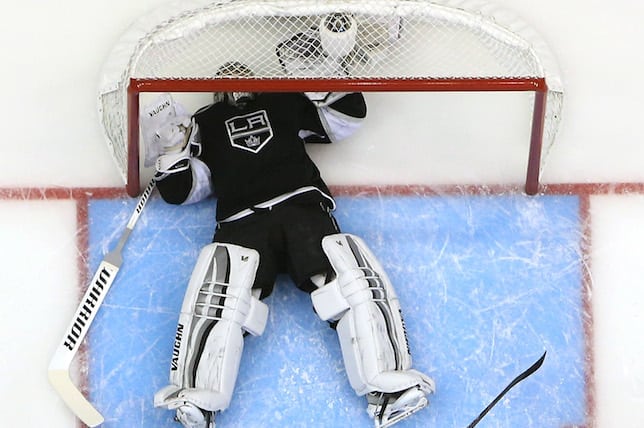
"Selling it" has become part of the NHL lexicon, particularly at playoff time when power plays can make the difference between moving on and moving out. Do we just hold our noses and accept that occasionally there are going to be stinkers? Or should the league look at clamping down harder on the perpetrators?
 Diving in the playoffs: do we just accept "selling it" as part of the game?
Diving in the playoffs: do we just accept "selling it" as part of the game?In the early stages of the Kings’ Game 4 win over the Hawks in the Western Conference final, before the tenor of the game had truly been set, play was relatively even.
While Los Angeles was dominating the faceoff circle and playing physically, Chicago was pushing back and drew a couple early penalties.
On the second of those two power plays, Marian Hossa went hard to the net, from behind the goal line, and in the process of cutting through the top of the blue paint, was knocked off balance by Jake Muzzin and into Jonathan Quick.
Quick went down and stayed down for an extended count. If it had been a boxing match, it would have been declared a knockout. However, after Hossa was assessed a minor for goalie interference, negating his team's power play, it turned out Quick didn’t need any assistance from the training staff. He didn’t even need magic water, jumping back to life like Warren Beatty's character in Heaven Can Wait.
Los Angeles scored on the ensuing man advantage (a goal by Muzzin, no less), seized momentum and barreled down hill, building a 3-0 first period lead. Game, for all intents and purposes, over.
The consensus was not only was the penalty call against Hossa dubious – the video evidence showed he was pushed and knocked off course by Muzzin – but that Quick “sold it.”
And that’s becoming a common refrain, particularly at playoff time, when we see players heads’ snapping back on high-sticks that just graze them, sprawls to the ice on minor contact, embellished falls on borderline obstruction plays.
Ingrained with a win-at-all-costs mentality, many players choose to try to dupe the officials to gain an advantage. It’s technically illegal, punishable by a two-minute minor for unsportsmanlike conduct, but tricky to catch and enforce.
One solution might be stiffer deterrents for those caught red-handed. If a player has been wounded badly enough to force a stoppage in play, what about mandating that he stay off the ice for a pre-determined period of time, a stretch longer than a few seconds? Goalies included.
If upon further review it becomes clear he feigned injury or embellished a fall, the NHL could try to enforce supplementary discipline. We stress the word "try". This approach would be thorny since it’s often difficult to prove intent via video and the NHLPA would almost certainly present opposition and protect their constituents.
Otherwise, there may not be much we can do about it, other than hope karma does its thing and bites perpetrators of deception in the butt.
That’s not much solace to the Hawks and their fans. Their team, which was 20 minutes away from taking a 2-0 hold of the Western Conference final a few days ago and looking like a decent bet to be the NHL’s first repeat champ this century, is now gasping to remain alive.
Full credit to Los Angeles for elevating its game and taking command. The Kings are, right now, the class of the field and may well have won Game 4 without the Hossa call. It’s just a shame we’ll never know for certain.







